How to See the Liberty Bell...in Queens
A copy of the famous American bell can be found inside a bank, which itself is modeled after Independence Hall!


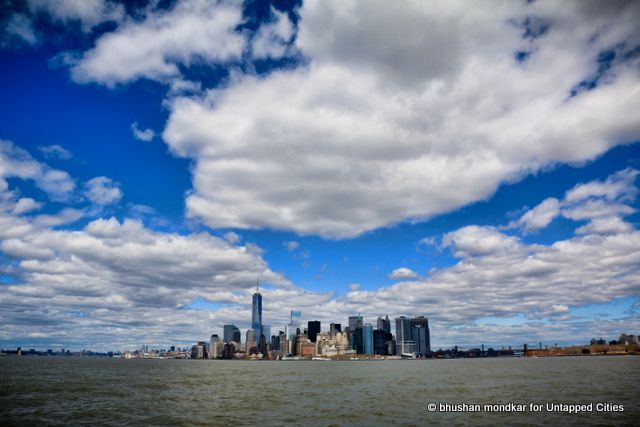
As we sailed north, along Manhattan’s iconic skyline, the tall, taller and tallest of its architecture, soon blurred into a forested landscape and rocky terrain, reminiscent of the Mannahatta that Henry Hudson discovered four hundred years ago. The transition was quite evident as the Untapped Cities crew took to the waters aboard the classic harbor line yacht ‘Manhattan ‘ inspired by the famous (and infamous) commuter yachts of the roaring twenties. The three hour spectacle- called the Around Manhattan Architectural tour sponsored by the New York chapter of American Institute of Architects, offers some stunning insights into the past, present and future of the ever evolving city and its waterfront.
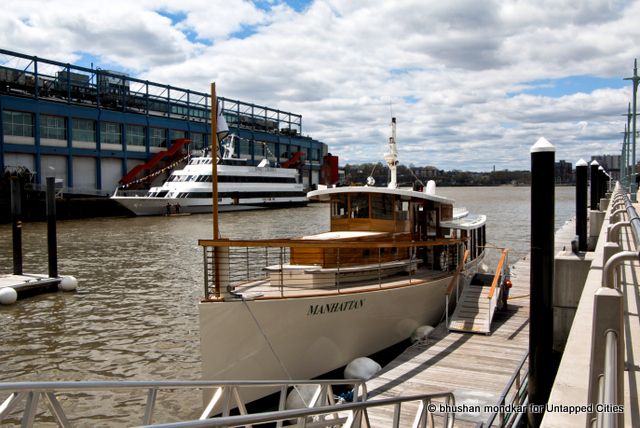
Our cruise set sail from Chelsea Piers, which in itself represents the dramatic story of New York’s waterfront. A marvel of its time, Chelsea Piers housed the grandest of ships from around the world, served as a takeoff point for soldiers departing for battle, and then as a cargo terminal. Gradually, like much of the waterfront, it became a neglected Manhattan relic until the 1990s, when it began its climb back to importance as a major recreational hot spot on the Hudson.
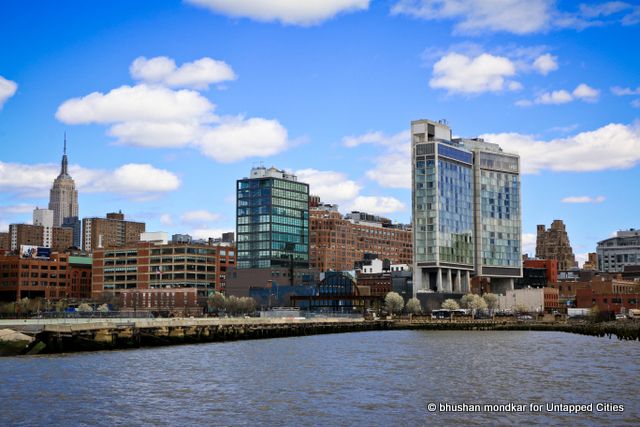
The juxtaposition of architectural styles was distinctly evident as we launched into the 32-mile voyage along New York’s sixth borough, intercepting more than 150 architectural icons that stand out in the dense urban forest. Our tour narrator, Scott Cook, cruised through different eras of architecture that characterize the story of New York– from remnants of a glorious industrial past, to the glamorous “starchitecture” sprinkled among large swaths of the “anonymous” architecture that populate the city.
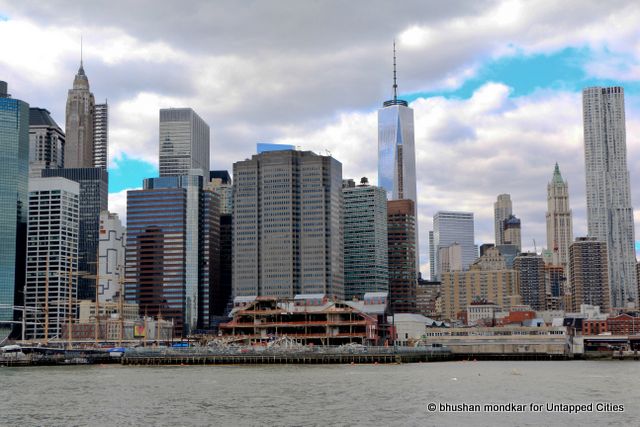
South Street Seaport Mall is almost fully demolished: more photos.
Sailing along the ‘BIG U,’ a multitude of glassy, reflective buildings punctuate the skyline towering above the Gothic skyscrapers that once raced for supremacy in the heaven-climbing contest. Our eyes wandered from the pyramidal roof of 40 Wall Street aka the “Crown jewel of Wall Street” to the Gothic spire of 70 Pine street and the gorgeously ornamented, Neo Gothic Architecture of the Woolworth building. At times, bulky rectanguloids disrupted this magisterial skyline, but it’s the new World Trade Center complex that dominates the skyline. Towering up to 1776 ft, One WTC and its modest counterpart, Four WTC, reflect some dramatic views of lower Manhattan and the clouds they cut through.
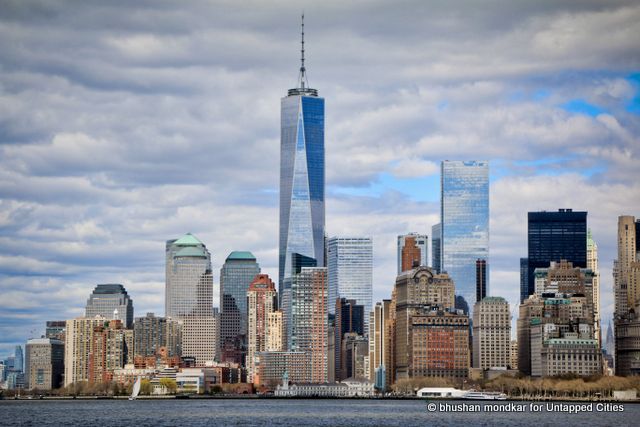
Across the waters, in stark contrast to the wall of skyscrapers, Ellis Island lays in tranquility. Designed in the French Renaissance style, the red brick immigration center was once the official gateway to America for 17 million immigrants, many of whom probably contributed to the vertical expansion of the city.
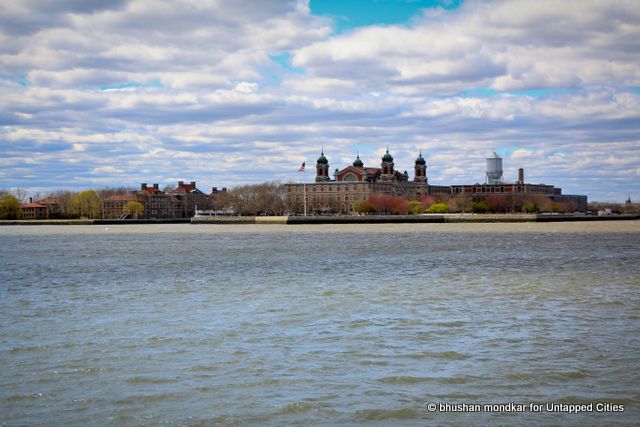
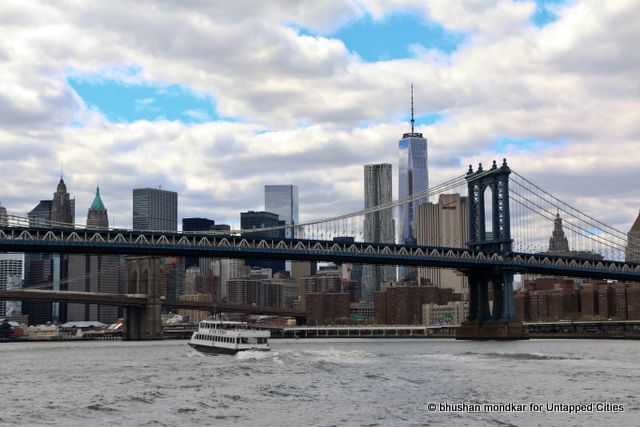
Passing under the triumvirate of Brooklyn, Manhattan and the Williamsburg Bridges, there was a sudden burst of overwhelming excitement with the cliffs and canyons of lower Manhattan on one side and rustic brick facades and smoke stacks on the other, like the Domino Sugar Refinery. Once a symbol of the booming manufacturing hub, most of these industrial relics will soon be re-fabricated to suit the needs of the 21st century economy.
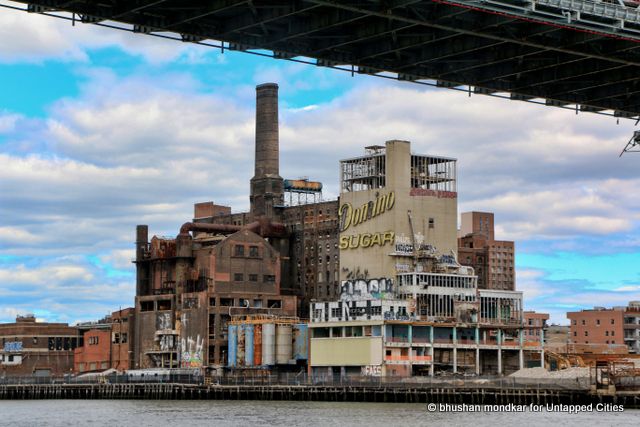
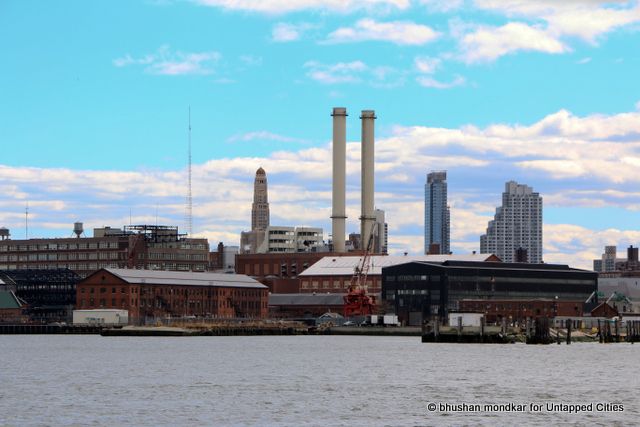
Heading up North, the skyline plunges into a sprawling wall of red bricks as the superblocks take over the waterfront–one of the many permanent marks left on Manhattan’s face by Robert Moses. But not for too long, as the elegant spires of the Chrysler, Empire State Building and the chamfered Citicorp Building stretch high up in the sky forming the crown jewels of the world’s most iconic skyline. Our cruise map once again got inundated with points of interest as we whisked passed the United Nations building, built on land that was once slaughter houses (and donated to the UN by the Rockefellers.).
On the opposite banks, the East River caressed the foundations of Four Freedoms Park, adorning the southern tip of Roosevelt Island. Decrepit ruins of the 19th century small pox hospital (the only ruins in NYC with Landmark status) formed a picturesque backdrop to the monumental granite blocks.
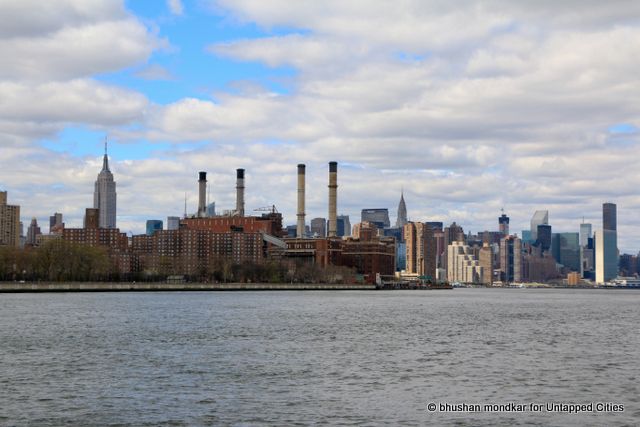
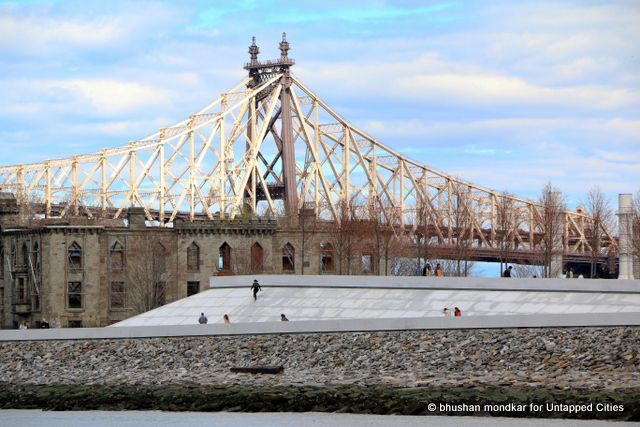
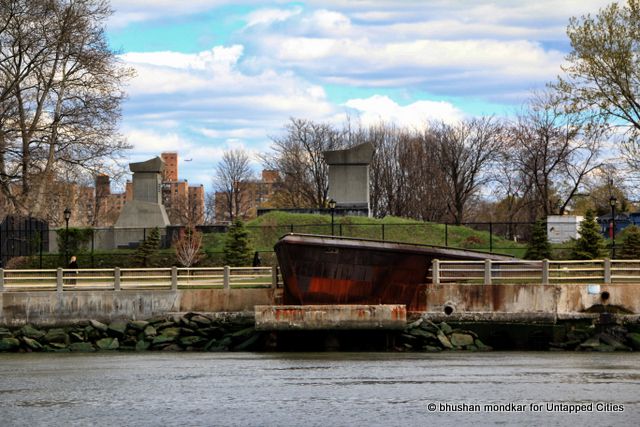
Continuing north through the narrow tidal straight of the Harlem River, lush green swaths of woodlands soon take over the steep topography of northern Manhattan. From Highbridge Park and Harlem River Park to the New York Restoration Project’s celebrated Swindler’s Cove, this portion of the tour gave us glimpses of the undulating terrain and dramatic natural landscape that once blanketed Manhattan.
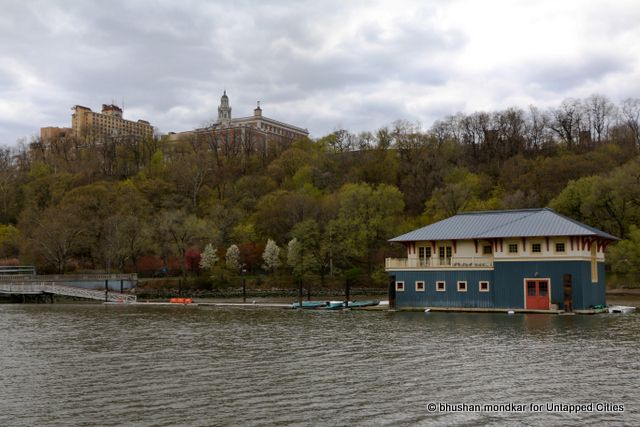
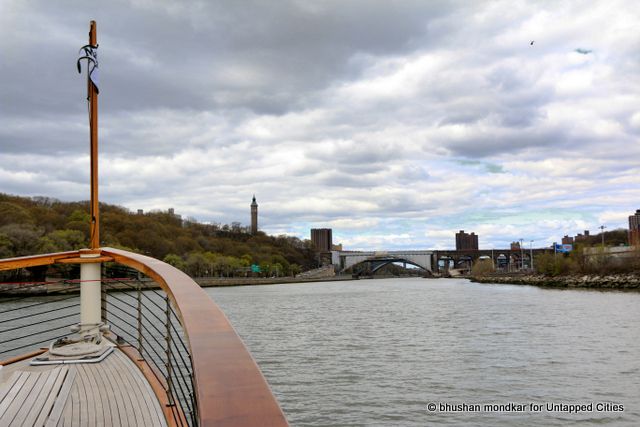
Oh, and did you know there are 21 bridges connecting Manhattan to adjacent islands and mainland America? We cruised under all of these historic engineering marvels, many of them spanning across the Harlem River. At the northernmost tip, one of them also swings open and the narrow strip of water swells into the mighty Hudson, as the cliffs of the Palisades stand fixed in time and stark contrast to the iconic architectural landscape of Manhattan.
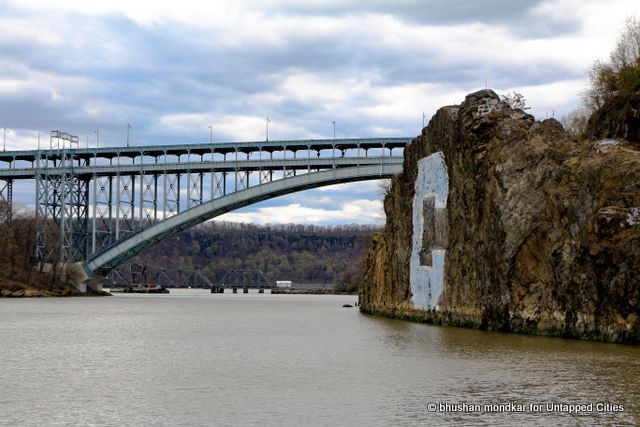
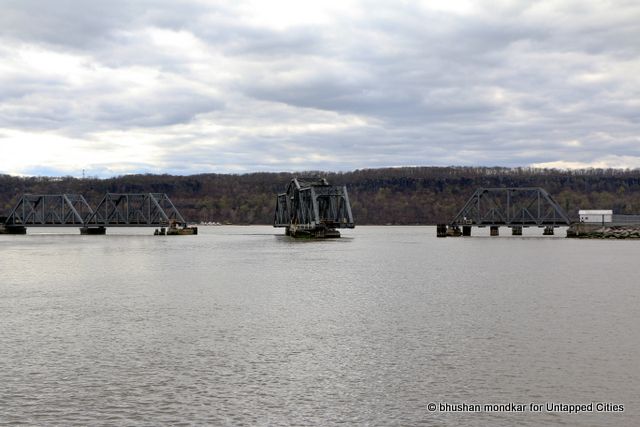
The Spuyten Duyvil Bridge is a railroad swing bridge that runs across the Spuyten Duyvil creek between Manhattan and the Bronx
Passing under the grand George Washington Bridge and the Little Red Lighthouse at its feet, the banks of Hudson River get speckled with gems such as Riverside Church, modeled after the 13th-century Gothic cathedral in Chartres, France to Grant’s Tomb and the Cloisters.
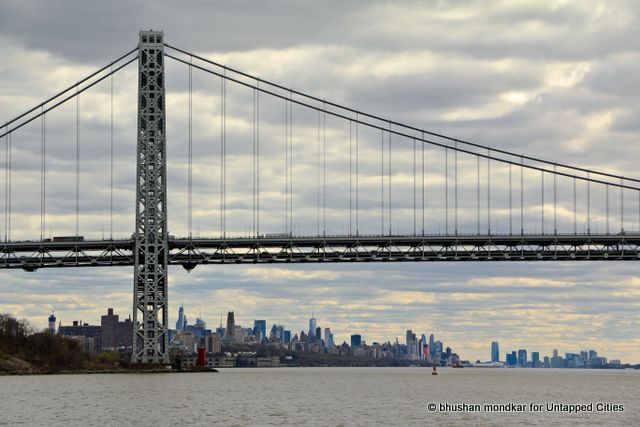
Did you know that the George Washington Bridge was supposed to be a Beaux-Arts bridge clad in stone?
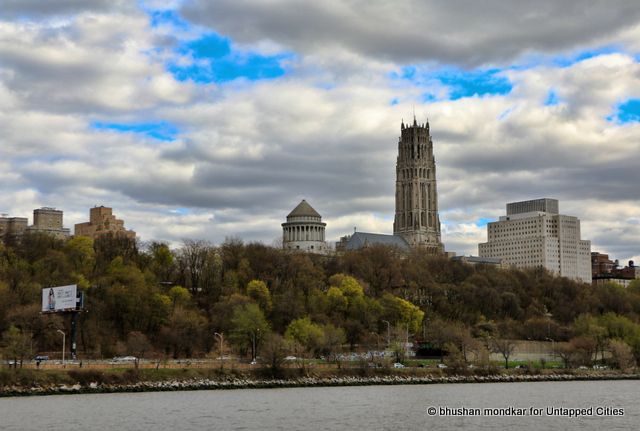
Grant’s Tomb
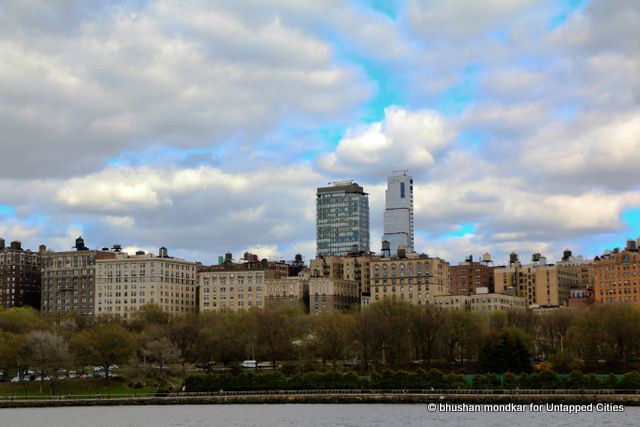
On the upper west side, the iconic New York water tanks give a distinct identity to an otherwise flat skyline but within a matter of few blocks the starchitecture rises up through the city, painting castles in sky. The final sight on the cruise, a new residential tower, 200 Eleventh Avenue, takes luxury to an altogether new level, as an 8000 pound freight elevator whisks ‘your’ luxurious cars right into the apartment. They call it the sky garage! Down below, some 50,000 New Yorkers spend the night in homeless shelters.
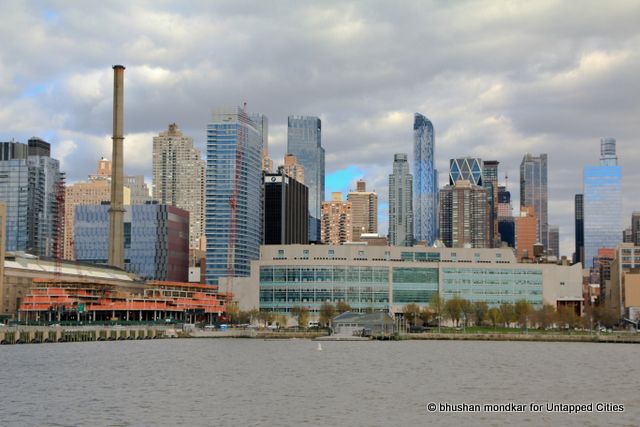
New York is an urban mosaic in the making, and the multiple layers that built the city can so easily be overlooked while exploring it on solid ground, but aboard the Manhattan, layer after layer of New York’s story is revealed through architecture. Summer, of course, is a great reason to get off the grid and take on the currents. The AIA boat tour around Manhattan is a great way way to experience New York’s celebrated waterways, with some hors d’oeuvres, a glass of Champagne and the cool wind in your hair.
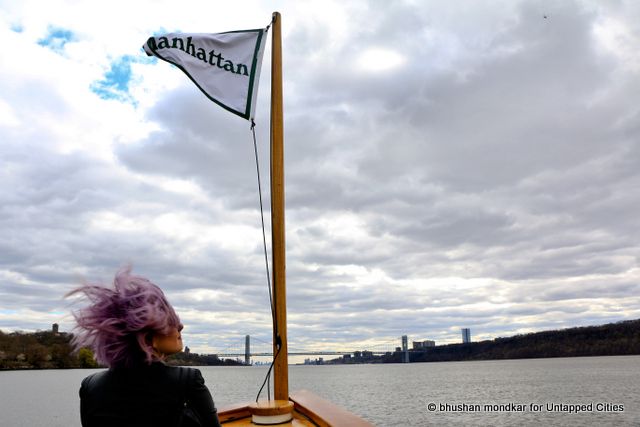
Bhushan is an Architect and Urban Designer at Perkins Eastman. Get in touch with him @bhushan_NYC. This article was written in part by Catherine Mondkar.
Subscribe to our newsletter